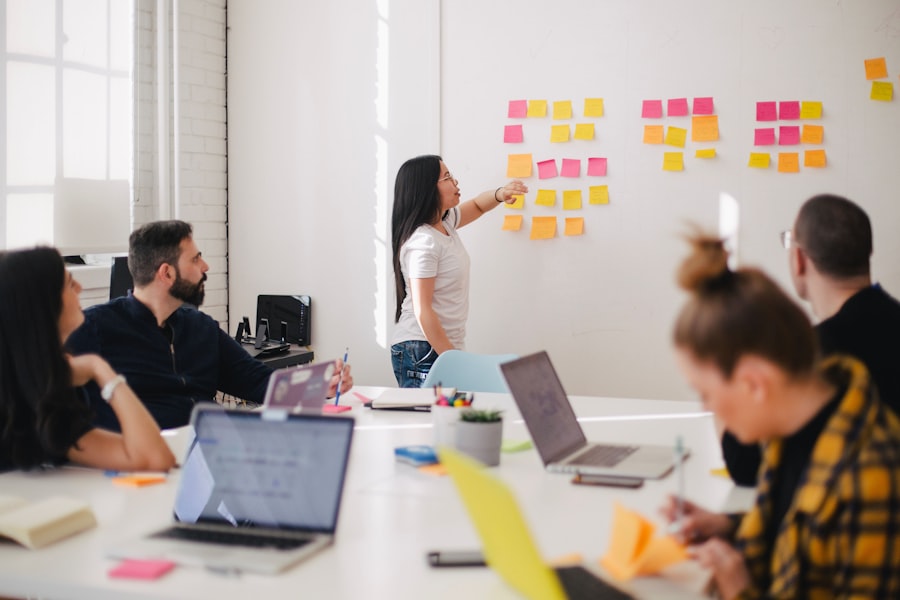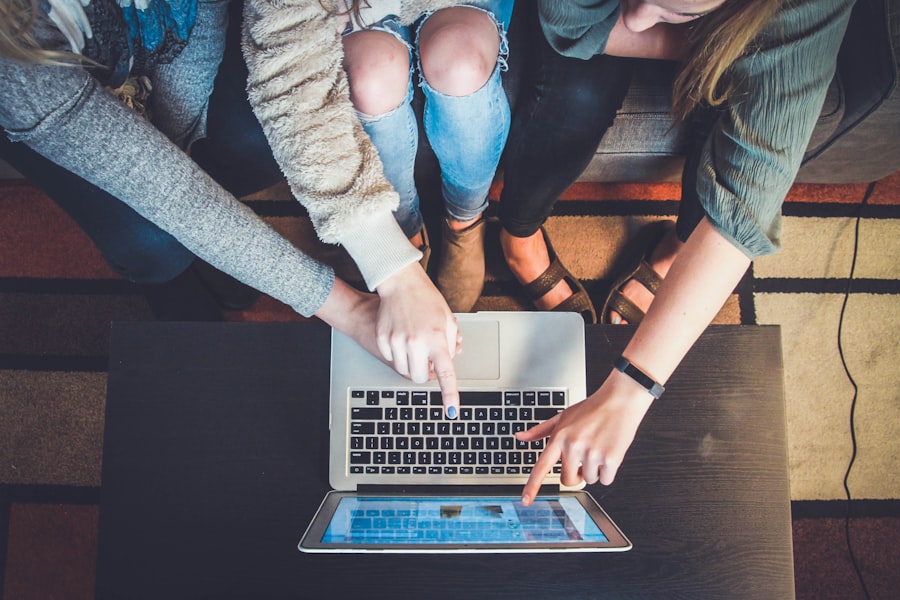Group interviews involve multiple candidates being interviewed simultaneously by one or more interviewers. Employers use this format to evaluate candidates’ interpersonal skills, communication abilities, and collaborative potential in a group setting. Various formats exist, including panel interviews, group discussions, case studies, and group activities.
Panel interviews typically involve multiple interviewers posing questions to the group or individual candidates. Group discussions center on open-ended questions that encourage candidates to share opinions and ideas on specific topics. Case studies require collective problem-solving, while group activities may include team-building exercises or role-playing scenarios.
The primary purpose of group interviews is to observe how candidates interact, solve problems, and demonstrate interpersonal skills in a collaborative environment. This format allows employers to assess candidates’ teamwork abilities, leadership potential, and communication skills while observing how they navigate group dynamics. Understanding the structure and objectives of group interviews is essential for candidates to prepare effectively and perform well in this interview format.
Familiarity with various group interview types can help candidates anticipate what to expect and showcase their relevant skills appropriately.
Key Takeaways
- Group interviews typically involve multiple candidates being interviewed at the same time by one or more interviewers.
- Research the company and its culture, practice common interview questions, and prepare examples of your skills and experiences.
- Be respectful and attentive to other candidates, actively listen, and find opportunities to build on each other’s ideas.
- Showcase your leadership skills by taking initiative, facilitating group discussions, and collaborating effectively with others.
- Emphasize your unique skills, experiences, and perspectives that set you apart from other candidates.
- Stay calm, be flexible, and adapt to unexpected situations or conflicts that may arise during the group interview.
- Send a thank-you email to the interviewers and follow up on any additional information or next steps discussed during the interview.
Preparing for a Group Interview
Understanding the Company Culture
Candidates should research the company and its culture, values, and mission to understand what the employer is looking for in potential employees. It’s essential to review the job description and identify the key skills and qualifications required for the role.
Preparing for the Interview Format
Candidates should familiarize themselves with the format of the group interview and the types of activities or discussions that may take place. Practicing common interview questions and preparing examples of past experiences that demonstrate teamwork, leadership, problem-solving, and communication skills can help candidates feel more confident during the group interview. It’s also beneficial to practice active listening and effective communication techniques to engage with other candidates during the interview.
Presenting a Professional Image
Additionally, candidates should dress professionally, arrive early, and bring extra copies of their resume and any other relevant documents. During the preparation phase, candidates should also consider their body language and non-verbal communication. Maintaining eye contact, using open and confident body language, and being mindful of their tone of voice can all contribute to a positive impression during the group interview.
Overall, thorough preparation is essential for success in a group interview setting.
Strategies for Engaging with Other Candidates

Engaging with other candidates during a group interview is an important aspect of demonstrating interpersonal skills and teamwork. One strategy for engaging with other candidates is to actively listen to their contributions and show genuine interest in their ideas and perspectives. This can be done by nodding, making eye contact, and using verbal cues such as “I agree” or “That’s an interesting point.” Acknowledging and validating the input of other candidates can create a positive and collaborative atmosphere during the interview.
Another strategy is to build on the ideas of other candidates and contribute to the discussion in a constructive manner. This can involve adding new insights, asking clarifying questions, or offering solutions that complement the contributions of others. By actively participating in the conversation and building on the ideas of fellow candidates, individuals can demonstrate their ability to collaborate and work effectively in a team setting.
Additionally, candidates can demonstrate their leadership skills by facilitating the discussion or guiding the group towards a consensus. Taking initiative to summarize key points, mediate conflicting opinions, or delegate tasks can showcase leadership qualities and the ability to drive group discussions towards productive outcomes. Engaging with other candidates in a group interview requires a balance of active listening, constructive participation, and leadership skills.
Demonstrating Leadership and Teamwork
Demonstrating leadership and teamwork in a group interview involves showcasing one’s ability to collaborate effectively with others and take on leadership roles when necessary. One way to demonstrate leadership is by taking initiative to organize or facilitate group activities or discussions. This can involve proposing a structure for the discussion, assigning roles or tasks to different candidates, or setting goals for the group to achieve during the interview.
Another way to demonstrate leadership is by showcasing problem-solving skills and the ability to navigate group dynamics. This can involve mediating conflicts, finding common ground among differing opinions, or guiding the group towards a consensus. By demonstrating an ability to lead and navigate challenges within a group setting, candidates can showcase their leadership potential to prospective employers.
In addition to leadership, demonstrating teamwork is essential in a group interview. This can be achieved by actively collaborating with other candidates, being supportive of their ideas, and contributing constructively to group discussions or activities. Candidates can also showcase their ability to adapt to different team dynamics and work effectively with diverse personalities.
Overall, demonstrating leadership and teamwork in a group interview requires a combination of taking initiative, problem-solving, collaboration, and adaptability.
Highlighting Your Unique Skills and Experiences
In a group interview setting, it’s important for candidates to highlight their unique skills and experiences that set them apart from other candidates. One way to do this is by sharing specific examples from past experiences that demonstrate relevant skills such as leadership, teamwork, problem-solving, or communication. By providing concrete examples of how they have applied these skills in previous roles or situations, candidates can showcase their qualifications in a compelling manner.
Candidates can also highlight any specialized knowledge or expertise that they possess in relation to the role or industry. This can involve discussing relevant certifications, technical skills, or industry-specific knowledge that make them uniquely qualified for the position. By emphasizing their unique skills and experiences, candidates can differentiate themselves from other candidates in the group interview.
Furthermore, candidates can highlight their personal qualities and values that align with the company’s culture and mission. This can involve discussing their work ethic, passion for the industry, or commitment to continuous learning and professional development. By showcasing their personal attributes and values, candidates can demonstrate how they would be a good fit for the company’s culture and contribute positively to the team.
Handling Group Interview Challenges

Group interviews can be a complex and challenging experience for candidates. To succeed, they must navigate various obstacles and demonstrate their skills and abilities in a team setting.
Managing Conflicting Opinions and Personalities
One common challenge in group interviews is managing conflicting opinions or personalities within the group. In such situations, it’s essential for candidates to remain diplomatic, respectful, and focused on finding common ground or reaching a consensus. This can involve active listening, acknowledging differing perspectives, and finding ways to bridge differences in opinion.
Standing Out While Maintaining a Collaborative Approach
Another challenge is standing out among other candidates while still maintaining a collaborative approach. To achieve this, candidates can focus on showcasing their individual strengths and contributions while also demonstrating their ability to work effectively as part of a team. This can involve finding opportunities to lead certain aspects of the discussion or activity while also supporting and building on the ideas of other candidates.
Handling Time Constraints
Handling time constraints during group activities or discussions can be particularly challenging. Candidates can navigate this challenge by being mindful of time management, staying focused on key points, and ensuring that everyone has an opportunity to contribute. By demonstrating adaptability and effective time management skills, candidates can navigate this challenge successfully.
Following Up After a Group Interview
Following up after a group interview is an important step in the job application process. Candidates can send a thank-you email to the interviewers expressing gratitude for the opportunity to participate in the group interview. In the email, they can also reiterate their interest in the position and briefly highlight key points from the interview that showcase their qualifications for the role.
It’s also beneficial for candidates to connect with other participants from the group interview on professional networking platforms such as LinkedIn. Sending personalized connection requests with a brief message expressing appreciation for their insights during the interview can help build professional relationships with other candidates. Furthermore, if there were any unresolved questions or topics during the group interview, candidates can use the follow-up email as an opportunity to provide additional information or insights that may further demonstrate their qualifications for the role.
Overall, following up after a group interview demonstrates professionalism, gratitude, and continued interest in the position. In conclusion, understanding the format of a group interview is crucial for effective preparation and performance. Candidates should prepare thoroughly by researching the company, practicing common interview questions, and familiarizing themselves with the format of the group interview.
Engaging with other candidates in a collaborative manner while also showcasing leadership skills is essential for success in a group interview setting. Highlighting unique skills and experiences that set them apart from other candidates can help individuals stand out during a group interview. Navigating challenges such as conflicting opinions or time constraints requires adaptability and effective communication skills.
Following up after a group interview demonstrates professionalism and continued interest in the position. Overall, mastering the art of navigating a group interview can significantly increase one’s chances of success in securing a job offer.
If you’re looking to stand out in group interviews, it’s important to showcase your creativity and unique skills. According to a recent article on Careers Help, “The Role of Creativity in Career Development,” creativity can be a valuable asset in the job search process. By incorporating innovative ideas and thinking outside the box, you can make a lasting impression on potential employers. Check out the article for more tips on how to harness your creativity for career success. (source)
FAQs
What is a group interview?
A group interview is a type of job interview where multiple candidates are interviewed at the same time by one or more interviewers. This format allows employers to observe how candidates interact with each other and assess their teamwork and communication skills.
How can I stand out in a group interview?
To stand out in a group interview, it’s important to actively participate in group discussions, demonstrate good communication and listening skills, show leadership potential, and contribute unique and valuable insights to the conversation. Additionally, being respectful and supportive of other candidates can also make a positive impression.
What are some strategies for succeeding in a group interview?
Some strategies for succeeding in a group interview include preparing thoroughly by researching the company and practicing common interview questions, actively engaging with the other candidates and interviewers, showcasing your teamwork and collaboration skills, and being confident and assertive while also being respectful of others.
How should I prepare for a group interview?
To prepare for a group interview, it’s important to research the company and its culture, practice answering common interview questions, and familiarize yourself with the job description and requirements. Additionally, you can prepare by thinking of examples from your past experiences that demonstrate your teamwork, leadership, and problem-solving abilities.
What are some common mistakes to avoid in a group interview?
Some common mistakes to avoid in a group interview include dominating the conversation and not allowing others to speak, being overly competitive or dismissive of other candidates, failing to actively participate in group activities, and not listening to or acknowledging the contributions of others. It’s also important to avoid being overly aggressive or confrontational.



